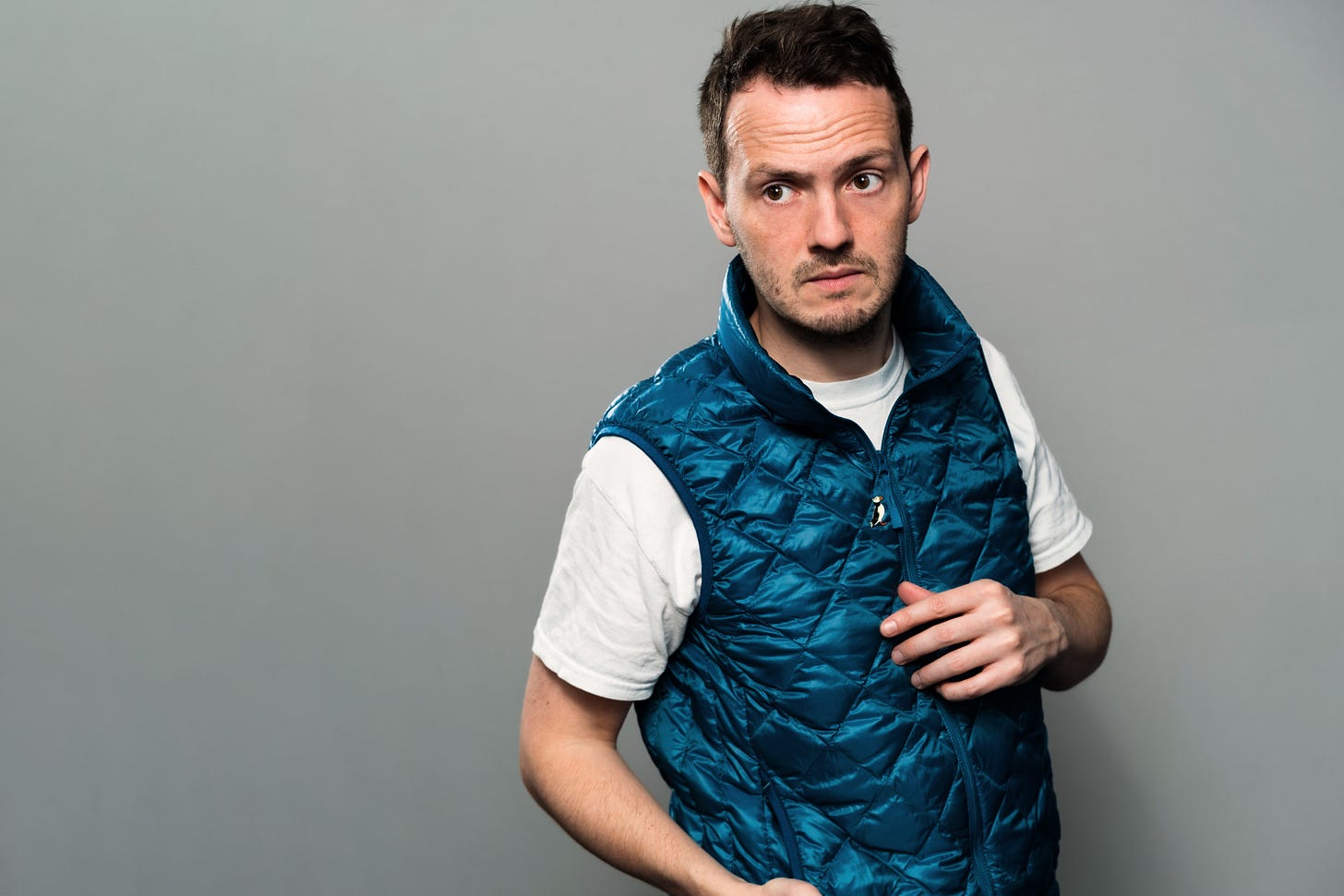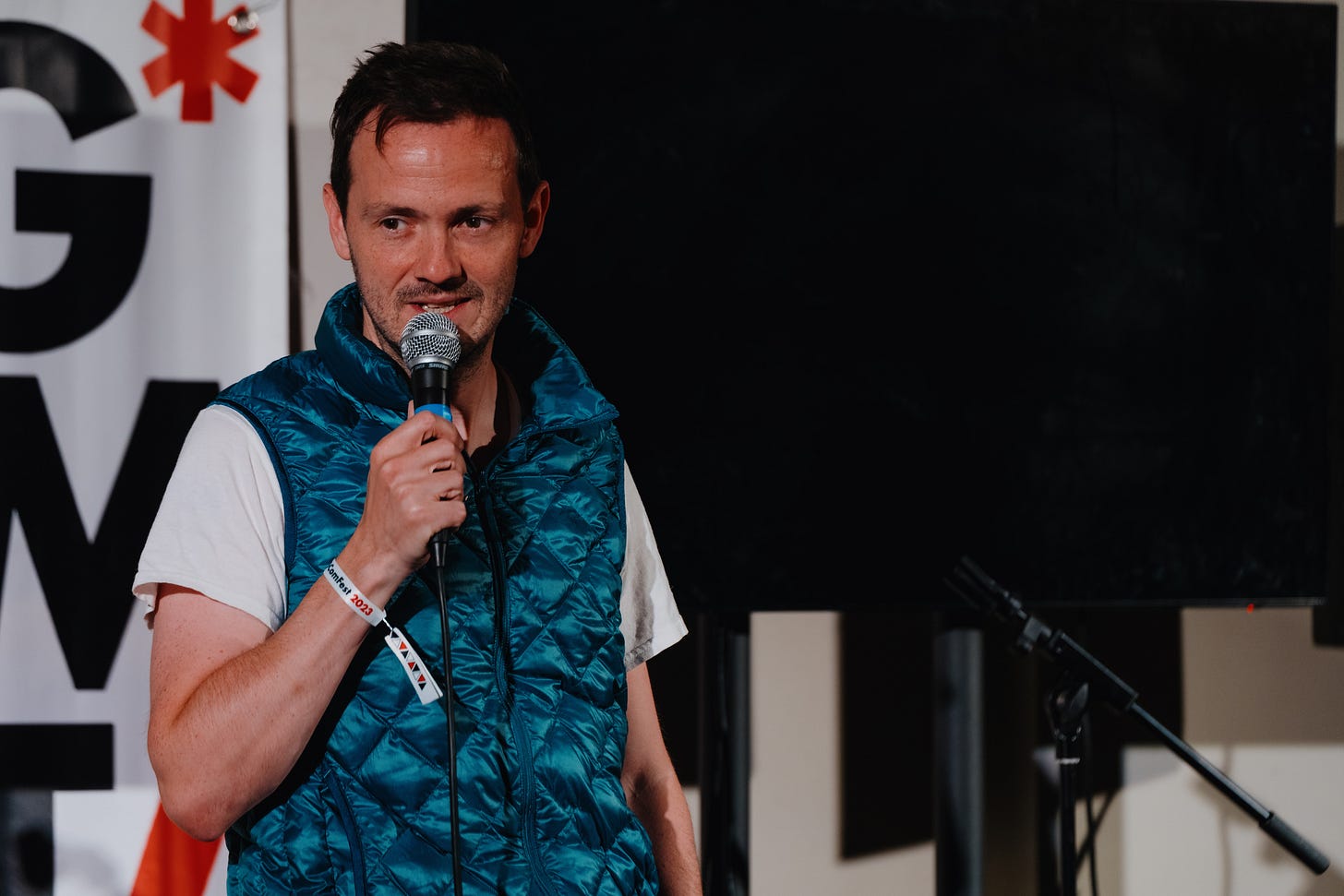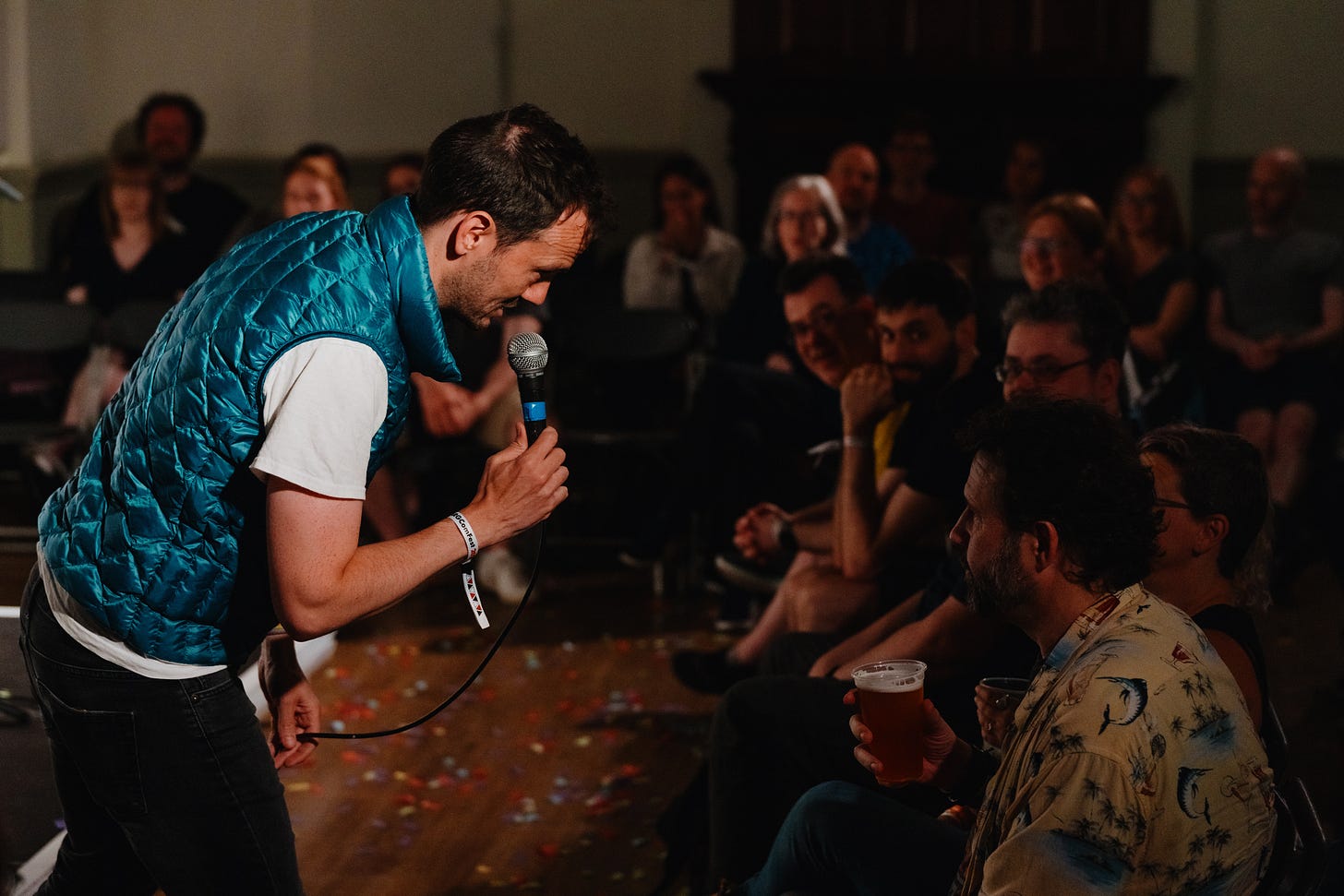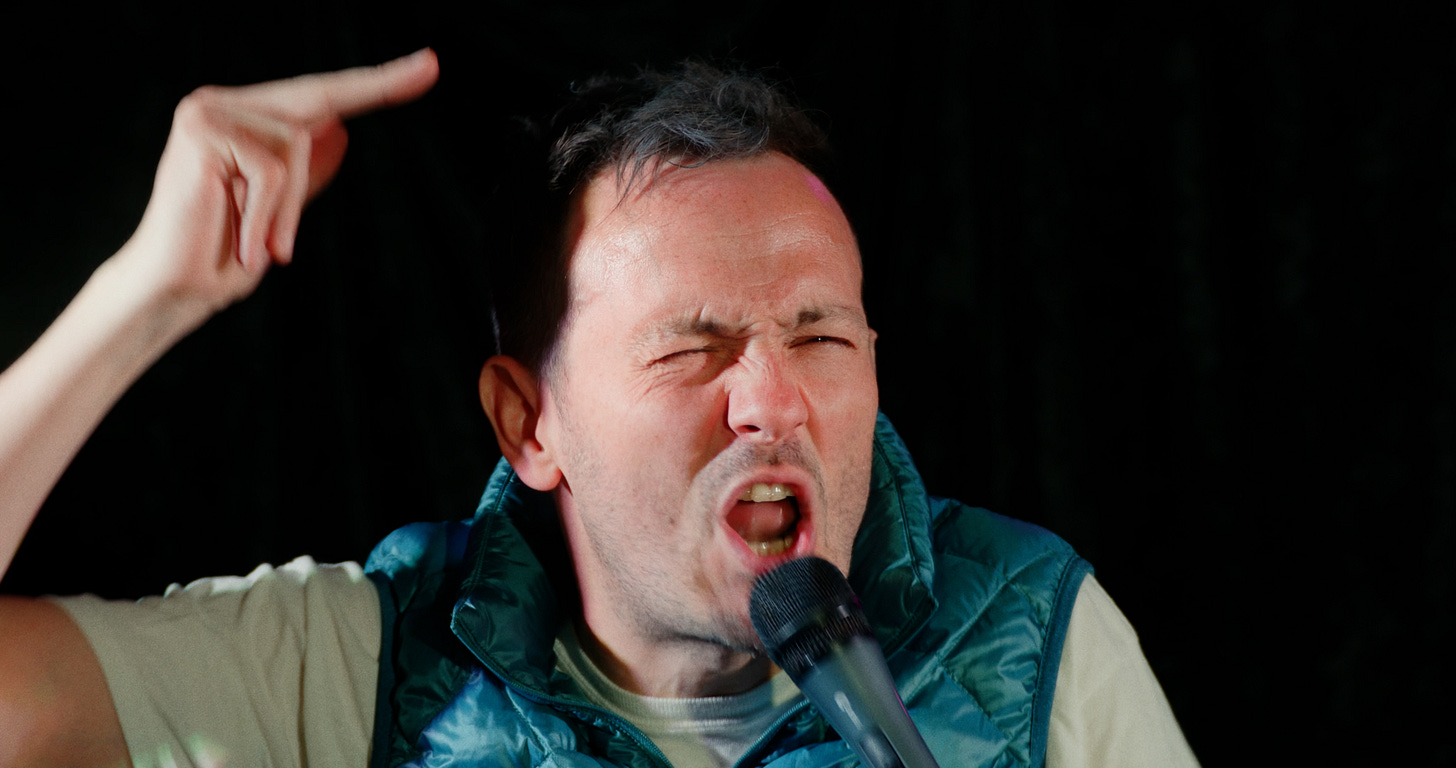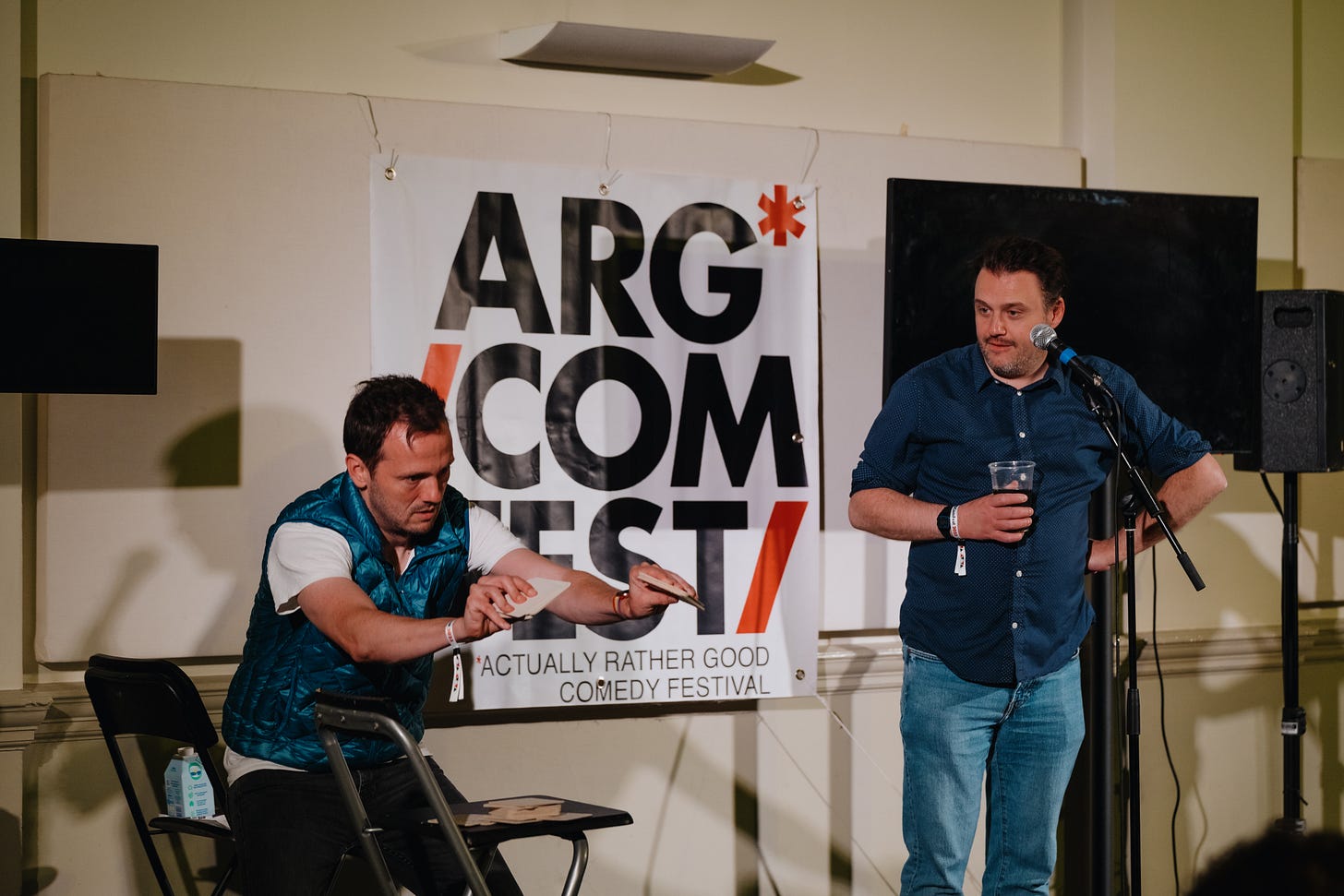Critics Wooed by the New Stuart Laws
Stuart Laws is a British stand-up comedian, writer, director and producer. I spoke to him about his upcoming tour, his recent autism diagnosis and more.
Stuart Laws is a British stand-up comedian, writer, director and producer. His latest and most personal Edinburgh show received nine 4-star reviews, proving he’s found the sweet spot; in 2025 he’s taking it around the country. It’s called Stuart Laws Has To Be Joking? The show explores his personality for the first time in light of an autism diagnosis at forty.
His offstage work should be familiar to you, as he’s produced and/or directed for a long list of big names including James Acaster, Fern Brady, Dara Ó Briain, Catherine Tate, Ed Gamble and more. [1] I spoke to him via Zoom, asking both scripted and unscripted questions. Towards the end, he even filled me in on a highly anticipated beer-mat flipping contest.
*Audio below the article
How would you describe your comedy?
I would describe my comedy as “Not for everyone,” but I’m trying to change that.
How are you trying to change?
Early on, a friend described my humour as “Observational comedy… By a comedian who doesn’t understand what he’s observed.” This was pre-diagnosis, and that was fine for a while; I wanted to be a sort of “cool,” indie artist who only some people would love. Now I translate my thoughts into something more palatable, for a broad audience.
The diagnosis has helped with that. I understand my thoughts more, which helps with the translation - whether you’re neurodivergent or not. Plus, more neurodivergent people are finding my comedy, which is great, but the intention is to make it for everyone.
I don’t want to be seen as weird. I want audiences to go “I get that. We’ve all had thoughts like that,” or they might know someone who can relate.
Reading about the show, reminded me of Paul Foot’s tour Dissolve. He’s experimental and surreal, but he came out with a very personal show in 2023, talking about his depression. It’s strange how comedy connects with people when they can relate. He’s long been my favourite comedian.
Yeah, absolutely. I actually directed the recording of Paul’s special which should be out next year. It’s such a great, personal show and it’s the same sort of territory I’ve moved into.
My last tour was my first foray into personal storytelling. The special is coming out next February with 800 Pound Gorilla.
I found it freeing. I got the best reviews and responses I’d ever had, it seemed to be what critics and audiences had been looking for.
They already loved the whimsical side of my act i.e. playing with callbacks and jokes within jokes, but they felt I’d never shown them who I was before.
Did the autism diagnosis come as a surprise?
I was chatting to comedian Fern Brady about it beforehand, plus Pierre Novelli and Abigail Weinstock [all autistic].
Fern sent me an interesting article by Devon Price yesterday about the different stages of diagnosis. The first stage, it says, is “questioning,” and “it’s very common to spend months or years questioning if you’re disabled and have the right to openly identify as such.” For at least a year and a half beforehand, I knew I wanted to find out for sure.
My friend Abi always described me as autistic, and initially, I told her it wasn’t a good idea for me to use the label, in case it didn’t turn out to be true. I was diagnosed in August, but from 2023 onwards I was pretty sure. I dated someone for a while pre-diagnosis and I described myself to them as autistic, and they were the first person I’d done that with. I said it was “very likely” and they were intrigued. It was good to finally say it outside of my tight friendship group, as discussing it with them and seeing their response felt useful.
You take the audience on a bit of a “date” with the new show. How does that work?
The show is about relationships. My last (Is That Guy Still Going?) had me talking about more vulnerable things, and revealing more of myself as the show went on. It was very much a “this guy might be autistic” show; because I didn’t know going into it.
In the new show it’s like “Yeah, this guy’s autistic,” but I didn’t want to do it in a way that had been done before. I wanted to add something to the discussion, and share how mind-blowing it’s been to talk openly about autism within a romantic relationship. It’s made me contemplate past ones.
The message is “How can you be in a relationship of any kind, romantic or not; if you don’t know who you are.”
Until now, I never knew how to put myself across to audiences. I found it difficult to start shows and communicate things. By the end, the audience and I go through a breakup - we have to, otherwise the show would still be going on, ha-ha. It’s a useful framing device, instead of jumping from one topic to another i.e. friendship, romance etc.
Are you having more fun, now that you’ve discovered your autism and started talking about it?
Definitely, in terms of the job. At forty I feel old now, and I know a bunch of older people will be like “Come on, man,” but I just do. It comes with certain perks.
It was my first year of having proper PR for the Edinburgh Fringe, but also, I got to see how people wrote about me. I’ve had reviews here and there, but this time I had 14 at the festival. I scan over them just to check that nothing offensive has been written, and move on. I mean hey, I just want to have all the data.
I was getting described as “an elder statesman.” Someone who’s been around for a while but has entered a new era, with more experience. “A cult figure” and things like that. I realized I’m no longer the cool new-kid on the block, I’ve got experience. You begin to trust that you’re good. You go out there and have fun with it, only doing the gigs you want to do.
Before, you’d do gigs knowing it might get you other opportunities, whereas now I can just ask and bypass that process a bit. There are some gigs I know I’ll never do just because of the effort required to get to them. I’m older and want to enjoy this as much as I can.
It would be awful to get finished with the career and think “Do you know what? All I did was get through that.”
Yeah!
Have you asked for any accommodations since your diagnosis i.e. dimming the lights? Etc.
Interesting. I actually haven’t.
When I’m on stage, it’s a different state of mind and I can ignore those concerns. It’s really the ultimate example of masking (hiding) my autism. I had a half-developed joke that didn’t get in the show, about me suspecting I might be the best at masking my autism… And how I’m no longer the best at masking it once I’ve told the joke…
You’re right though, perhaps I’m not examining the situation enough; addressing it could make the situation so much easier and better… Off stage I’m doing way more.
Who are your comedy influences?
Straight away, Harry Hill. Watching his show on Channel 4, I’d never seen anything like it and couldn’t believe it was on mainstream TV. I was excited to see someone doing totally weird stuff that seemed to be landing with a broad audience. The same with Vic & Bob, and Shooting Stars.
French & Saunders influenced the filmmaking side of things. They did “the making of” “The Making of Titanic,” which was such a meta mind-f**k. I didn’t realize you could bend the rules like that and play all the characters. It looked like they were having the most fun.
You’re constantly influenced by your peers. Harriet Kelmsley, Lou Sanders, James Acaster, Nish Kumar and Ed Gamble. Even people I know less well like Sam Campbell. I find each of those inspiring, even when they’re doing a different style of comedy. The approach is inspiring. For example, everyone thought Lou was so funny but she didn’t seem to get on TV, and suddenly she’s on TV everywhere and instantly recognizable. It came from hard work, and a dedication to getting the shows as good as possible, but also working the industry side.
Each of them has worked to progress their career, and they’ve shown it’s about more than just being funny.
How do you write unusual punchlines?
My phone is full of tiny thoughts that eventually become material.
Something recent: All I wrote was “Therapist, but in the round.” And I don’t know what that is or how it will lead to a joke. I just had that visual pop into my head. I have countless thoughts like that, where it’s nothing groundbreaking… But I can build on it.
In 2022, I was flying home from the US, a real long-haul flight from the Westcoast. I wrote “Pretend you’ve got a wife” and a couple of notes around it. At a later date, I sat down and wrote a 1,500-word routine, and it poured out of me because I’d had the idea for a good while, ruminating on it and having it pop back into my head occasionally. It became the opening to the show. Eventually, I reveal the lie and use it as an opportunity to talk about truth-telling. I’ve given them a taste of what my comedy used to be like, and I tell them I’m not going to be like that anymore. Those 1,500 became 800 words, so roughly a 15–20-minute routine, chopped down to 8 or 10.
Is it performed exactly as written?
It’s just a guideline until I hit sections that need a very specific wording. Some ideas need exactly the written words.
I find it useful to have these written documents, because I know an hour of material will be 6,500 - 8,000 words; I speak quite quickly. Then you get people like Nish who probably gets through 10,000 words in the same time. Someone like Rob Auton, who speaks slower might do 5,000.
Do you ever get stuck, endlessly tweaking a routine?
Yeah, but I think that’s the beauty of live comedy. The audience response tells you where you’re at in the process.
The Fringe taught me that I know the show is good… But I needed to know it better, and have five more previews to play around with it. So, by the middle of my Edinburgh run, I felt I’d built the “Platonic ideal of the show” – it solidified, basically. Then three quarters of the way through, I got to the stage I like being at, where I’m playing around. It became looser. It was so lodged in my brain that I could go completely off-course if the room demanded it. And that’s where I want to be. The show is about being in a relationship, so it ought to be reactive to what the room is giving you. One show went off the rails within the first two minutes, it was chaos, and I only got through about two-thirds. A theatre director came up afterwards and said it was one of the most incredible stand-up shows he’d seen.
Did that experience alter the script?
Yeah, and it meant I didn’t have to be tied down by it anymore. My favourite gig on the last tour was in Bristol, purely because of the chaos. It was only supposed to run for 58 minutes, but I did 75 because of the energy in the room.
I plan to film the new show at four different venues, and I might take the first fifteen minutes from one show, the next fifteen from another and so on…
I’ve done a heavily scripted special before and I’m so proud of it, but this time I want to bring the chaos back in.
Is surprise your biggest comedy weapon?
Yeah, I think so. Plus, audiences like to hear topics discussed in a new way. That’s what every comic aims for, I assume.
There’s nothing quite like watching a comedian go off script, and when they’re experienced, you’re not worried the performance is in danger.
My partner and I (Chloe Radcliffe) both did a show a couple of nights ago. It was a good line-up; comics with really good stagecraft, but just newer. You could tell the audience was a bit anxious, they could sense the newness. Lots of good jokes, but you wonder if the next one will land. Then both of us got up to do our sets and there’s something about having done it for over a decade; the way you hold the mic, the way you sit in a silence. Audiences respond to it. Even if the next joke isn’t funny, they feel more comfortable in your presence.
It often takes a decade to get there. When a comic is really good early in their career I hate it, ha-ha. How dare you be so talented this early.
It sounds like comedy free-jazz what you’re doing nowadays. It’s like a bunch of guys up on stage making the notes up as they go along.
Ha-ha, my plan for the Fringe next year is for the show to flit between a one-man play and an improvised hour of comedy. Both extremes. I have the most fun when I don’t know where a bit is going to go, I thrive doing that. It’s difficult to create the conditions where the audience welcomes it. Conditions where they allow a bit of a lull, as you’re finding threads to pick up on. In my preparations for it I’ve been rushing back to the written material quicker than I should.
Tell me about the beer mat-flipping contest. Why the flip are you doing it?
Ha-ha, as a kid I went to working men’s pubs and clubs with my dad, and he taught me beer-mat flipping. You take a beer-mat/coaster, you put it half over the edge of a table. Then you put your hand under it and flip it forward 180 °, catching it with the mat facing the other way up, in one smooth movement. Then you might stack ten beer mats or do it two-handed. You often have a “speed round” where you lay ten out, and try to do them all as quickly as possible.
I love it. When I did it with friends, I watched them get really into it. So, I knew there was “something in this,” because it grabs people so quickly. I wanted to do a live version.
It needs a pub’s/darts atmosphere, so I’ve got my friend Matt who plays bass and he gets the energy up by soundtracking the night. I need a co-host; because I can do the technical analysis, but you want someone who brings the big vibes - I chose Sikisa, she’s perfect for that. We’ve done seven or eight of them over the years.
This will be the biggest show yet, at the Pleasance in London. It’s the perfect venue for it.
That’s all folks, I really enjoyed talking to Stuart.
We also chatted about the Killers; you can hear this at 6 minutes 50 in the audio below. He recommended their Letterman performance of A Dustland Fairytale, which I found very affecting.
His website lists details of the events mentioned, including the upcoming tour, with links to buy tickets. You should also follow Stuart on X and Instagram; if you haven’t already.
Audio
[1] Larry Dean, Josh Pugh, Nish Kumar, Helen Bauer, Huge Davies, Kiri Pritchard-McLean, Steve-O, Tom Allen, Andrea Hubert and Stuart Goldsmith.




